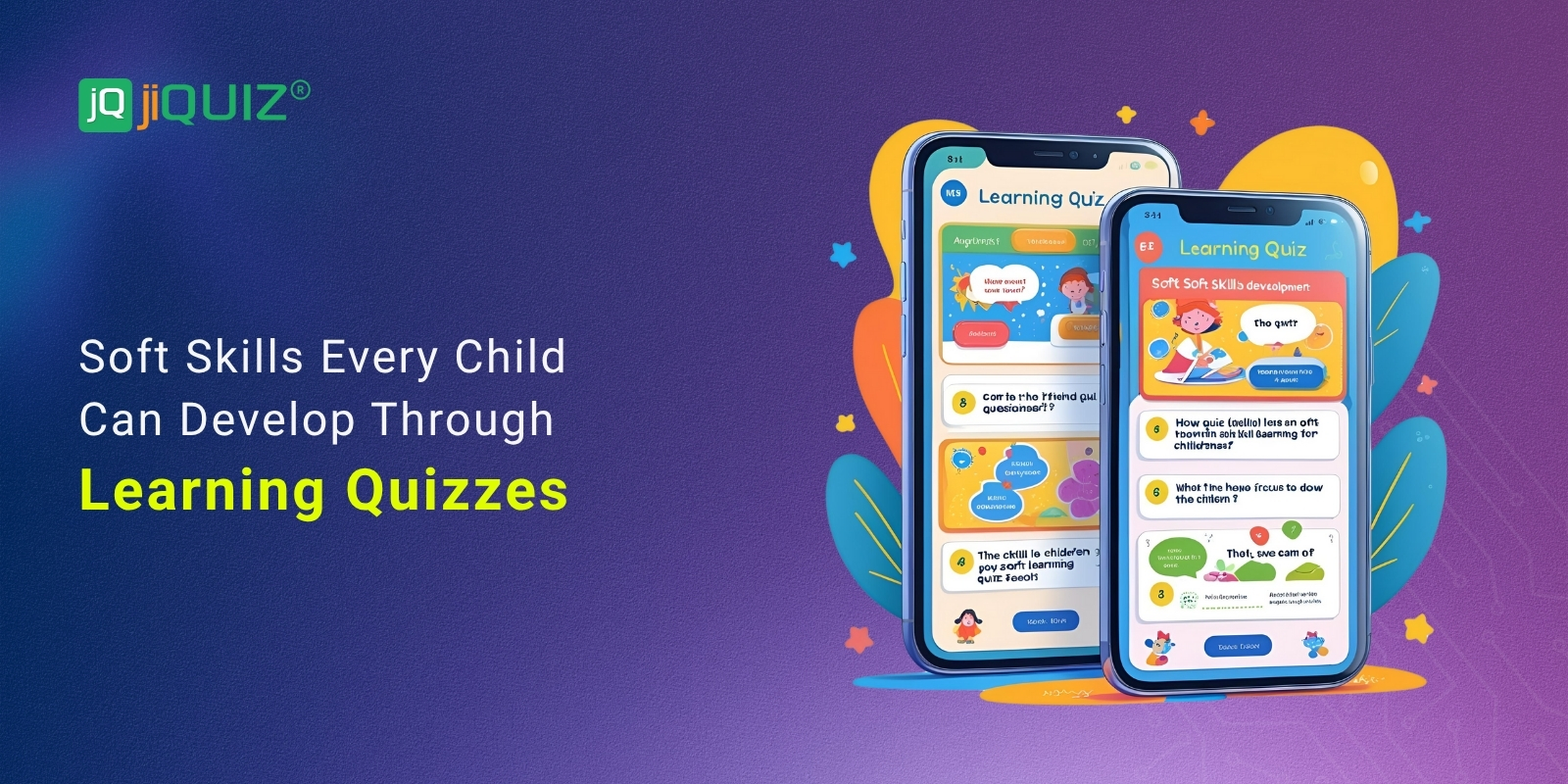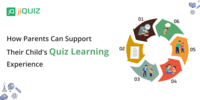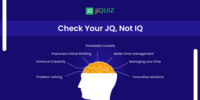- Jul 17, 2025
- Quiz Tips
- 437
Share this post on:

We often think of quizzes as purely academic tools – a way to test knowledge and grade understanding. But what if quizzes could be so much more? What if they could be powerful tools for cultivating essential soft skills – those crucial interpersonal and emotional abilities that are vital for success in school, work, and life? The truth is, when designed and used thoughtfully, learning quizzes can do just that.
This isn't about turning every quiz into a personality assessment. It’s about recognizing that the process of taking a quiz – and even failing a quiz – can provide valuable opportunities for children to develop skills like resilience, communication, problem-solving, and self-awareness. Let's explore how!
What are Soft Skills, and Why Are They So Important?
Before we dive into the quiz connection, let's clarify what we mean by "soft skills." Unlike hard skills (like coding or math proficiency), soft skills are about how you interact with the world and others. They include:
- Communication: Clearly expressing ideas, actively listening, and understanding nonverbal cues.
- Collaboration: Working effectively in a team, sharing responsibilities, and respecting diverse perspectives.
- Problem-Solving: Identifying issues, analyzing situations, and developing creative solutions.
- Critical Thinking: Evaluating information, forming judgments, and making informed decisions.
- Resilience: Bouncing back from setbacks, learning from mistakes, and maintaining a positive attitude.
- Self-Awareness: Understanding one's own emotions, strengths, and weaknesses.
- Time Management: Organizing tasks, prioritizing, and meeting deadlines.
- Adaptability: Adjusting to change, embracing new situations, and being flexible.
These skills aren’t just “nice-to-haves”; they are increasingly recognized as essential for future success. Employers consistently rank soft skills as highly desirable, often alongside, or even above, technical abilities. And, perhaps even more importantly, they contribute to emotional well-being and fulfilling relationships.
How Quizzes Can Foster Soft Skill Development
Now, let’s connect these soft skills to the experience of taking quizzes. Here's a breakdown of specific areas and how a well-designed quiz approach can help:
1. Resilience and Growth Mindset: Embracing Mistakes
- The Problem: Many children develop a fear of failure. A poor quiz score can be devastating, leading to discouragement and a reluctance to try again. This reinforces a "fixed mindset" – the belief that abilities are innate and unchangeable.
- The Quiz Solution: Reframe the quiz as a learning opportunity. Emphasize effort and progress over simply getting the “right” answer. Discuss why an answer was incorrect, focusing on the underlying concept. Praise effort and perseverance, even if the outcome isn't perfect. Use quizzes to pinpoint areas of weakness, which can then be addressed with targeted learning.
- Example: Instead of saying "You got a bad grade," say, "This quiz highlighted that we need to review fractions a bit more. Let's work through some practice problems together!"
2. Communication and Explanation: Articulating Understanding
- The Problem: Many children struggle to explain their reasoning, even when they think they understand a concept. They might memorize facts without truly grasping the underlying principles.
- The Quiz Solution: Design quizzes that require explanations, not just multiple-choice answers. Ask “Why?” questions. Encourage children to elaborate on their answers, even if they’ve chosen the “correct” option. Create opportunities for peer discussion and explanation. Have children teach the material to someone else.
- Example: After a history quiz, ask, "Why was the Magna Carta considered such an important document? Can you explain it in your own words?"
3. Problem-Solving and Critical Thinking: Analyzing and Strategizing
- The Problem: Rote memorization often takes precedence over genuine understanding and problem-solving.
- The Quiz Solution: Incorporate questions that require analysis, inference, and application of knowledge. Pose scenarios or case studies that demand critical thinking. Encourage children to identify patterns and draw conclusions. Allow open-ended questions that invite creative solutions.
- Example: Instead of "What is the capital of France?", ask, "Imagine France is experiencing an economic crisis. What are some potential challenges they might face, and how could they be addressed?"
4. Collaboration and Teamwork: Learning from Peers
- The Problem: Individual learning often isolates children, hindering their ability to collaborate and learn from others.
- The Quiz Solution: Implement group quiz activities. Allow children to discuss questions and share their reasoning. Encourage peer tutoring and collaborative problem-solving. Design quizzes that reward teamwork and communication.
- Example: A team quiz where each member specializes in a different subject area and then shares their knowledge to answer questions collectively.
5. Self-Awareness and Emotional Regulation: Understanding One's Own Performance
- The Problem: Children often lack the ability to accurately assess their own learning and emotional responses to challenges.
- The Quiz Solution: After a quiz, facilitate a reflective discussion. Ask questions like, "How did you feel before, during, and after the quiz? What strategies did you use to prepare? What did you learn about your own learning style?" Encourage children to identify areas where they excelled and areas where they need more support.
- Example: Create a simple self-assessment form where children can rate their effort, understanding, and confidence levels before and after a quiz.
Designing Effective Quizzes for Soft Skill Development
It's not enough to simply administer quizzes. The design itself is critical. Consider these guidelines:
- Focus on the Process, Not Just the Outcome: The emphasis should be on learning and growth, not just the final grade.
- Use a Variety of Question Types: Include open-ended questions, scenario-based questions, and questions that require explanations.
- Provide Constructive Feedback: Offer specific and actionable feedback that focuses on both strengths and areas for improvement.
- Make it Engaging: Use gamification, interactive elements, and real-world scenarios to keep children motivated.
- Offer Choices: Allow children to choose which quizzes they take, or allow them to choose how they demonstrate their learning.
- Create a Safe and Supportive Environment: Foster a culture of experimentation and learning from mistakes.
Addressing Potential Concerns
While quizzes can be a valuable tool for soft skill development, it's important to be mindful of potential concerns:
- Increased Anxiety: For children who already experience test anxiety, quizzes can exacerbate the problem. Create a supportive environment, offer accommodations, and focus on the process rather than the outcome.
- Overemphasis on Competition: Be careful not to create a competitive atmosphere that discourages collaboration and risk-taking.
- Misinterpretation of Results: Ensure that children understand that quizzes are just one measure of their abilities.
Conclusion: Unlocking Potential, One Quiz at a Time
Learning quizzes, when implemented thoughtfully, are more than just assessments; they are opportunities to cultivate essential soft skills that will serve children well throughout their lives. By shifting the focus from grades to growth, we can empower children to become resilient, communicative, and collaborative learners who are prepared to thrive in a complex and ever-changing world. Let’s unlock that potential, one quiz at a time!







